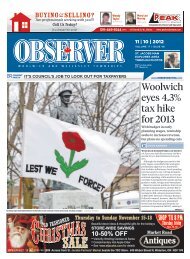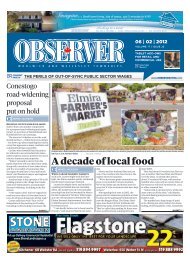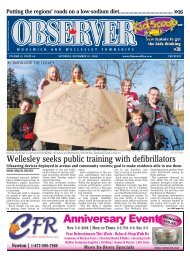09 January 10, 2009 - ObserverXtra
09 January 10, 2009 - ObserverXtra
09 January 10, 2009 - ObserverXtra
You also want an ePaper? Increase the reach of your titles
YUMPU automatically turns print PDFs into web optimized ePapers that Google loves.
<strong>10</strong> | COMMENT & OPINION<br />
Published Saturdays since 1996<br />
by Cathedral Communications Inc.<br />
Publications Mail Agreement No | <strong>10</strong>04840<br />
WOOLWICH OBSERVER<br />
20-B Arthur Street North,<br />
Elmira, Ontario, Canada N3B 1Z9<br />
Phone: 519.669.5790<br />
Toll Free: 1.888.966.5942<br />
Fax: 519.669.5753<br />
ASSOCIATIONS<br />
The Observer is a member of the Ontario<br />
Community Newspaper Association [OCNA],<br />
Canadian Community Newspaper Association<br />
[CCNA], Ontario Press Council, and The<br />
Greater KW Chamber of Commerce.<br />
LETTER POLICY<br />
The Observer welcomes letters to the editor<br />
on topics of interest to our readers. Letters<br />
may be edited for brevity, grammar, and legal<br />
considerations. All letters must be signed and<br />
contain the writer’s full name and telephone<br />
number for verification purposes. Unsigned<br />
or anonymous letters will not be considered<br />
for publication. If you have a legitimate<br />
concern and cannot sign your name to a<br />
letter, please contact the editor to discuss<br />
alternative means of resolving the issue. This<br />
newspaper declines announcements, poetry<br />
and thank-you letters in the opinion section.<br />
Maximum suggested length is 500 words.<br />
PRESS COMPLAINTS<br />
General Inquiry | EXT <strong>10</strong>0<br />
info@woolwichobserver.com<br />
Joe Merlihan, Publisher | EXT <strong>10</strong>7<br />
jmerlihan@woolwichobserver.com<br />
Steve Kannon, Editor | EXT <strong>10</strong>3<br />
skannon@woolwichobserver.com<br />
Joni Miltenburg, Reporter | EXT <strong>10</strong>1<br />
jmiltenburg@woolwichobserver.com<br />
Marc Miquel Helsen, Reporter | EXT <strong>10</strong>2<br />
mmhelsen@woolwichobserver.com<br />
Donna Rudy, Sales Manager | EXT <strong>10</strong>4<br />
drudy@woolwichobserver.com<br />
Pat Merlihan, Production Mgr | EXT <strong>10</strong>5<br />
pmerlihan@woolwichobserver.com<br />
Matthew French, Production | EXT <strong>10</strong>8<br />
mfrench@woolwichobserver.com<br />
Lindsay Lehman, Production | EXT 1<strong>09</strong><br />
llehman@woolwichobserver.com<br />
www.<strong>ObserverXtra</strong>.com<br />
CIRCULATION<br />
The Observer is an audited controlled circulation<br />
publication. Canadian Media Circulation<br />
Audit calculates and prepares The Observer<br />
circulation reports | 14,942.<br />
DELIVERY<br />
Delivery concerns can be addressed by contacting<br />
our office during office hours or by<br />
visiting www.<strong>ObserverXtra</strong>.com and send us<br />
a message.<br />
SUBSCRIPTIONS<br />
Annual subscriptions are available at a<br />
rate of $37.<strong>10</strong> (includes GST) for delivery<br />
within Canada. Contact the office or<br />
email sales@woolwichobserver.com for<br />
further details. All issues from 2006 on<br />
are available online free of charge.<br />
The Observer is a member of the Ontario<br />
Press Council which considers complaints<br />
against member newspapers. For more information<br />
about the Press Council contact<br />
www.ontpress.com.<br />
COPYRIGHT<br />
The entire contents of The Observer and online<br />
edition are protected by copyright. No<br />
portion thereof is to be reproduced or transmitted<br />
in any form or by any means without<br />
the specific permission of the publisher. Reproduction<br />
rights can be obtained from AC-<br />
CESS Copyright located at 1 Yonge St., 1900,<br />
Toronto, ON M5E 1E5 FAX: 416.868.1621<br />
»CARTOON<br />
»EDITORIAL<br />
»VERBATIM »THE MONITOR<br />
THE OBSERVER | Saturday, <strong>January</strong> <strong>10</strong>, 20<strong>09</strong><br />
Shantz leaves a remarkable legacy<br />
From the comments that followed the<br />
news of his death this week, Milo Shantz<br />
has left behind an assortment of legacies.<br />
Some cited his entrepreneurial acumen,<br />
some his philanthropy. Still others<br />
pointed to his support for faith-based organizations.<br />
His list of accomplishments<br />
was long. He certainly put St. Jacobs on<br />
the map. He was instrumental in bringing<br />
Habitat for Humanity to Canada.<br />
And helped many small businesses flourish,<br />
just to name a few.<br />
The most visible of Shantz’s many<br />
achievements was the reshaping of St.<br />
Jacobs. It’s no exaggeration to say the<br />
village is what he made it. The restaurants<br />
and shops of the downtown have<br />
his fingerprints all over them. The influence<br />
is seen even more clearly a little bit<br />
further south on King Street, where his<br />
Mercedes Corp. owns the St. Jacobs and<br />
Waterloo Farmers’ Markets, the Ontario<br />
Livestock Exchange and the St. Jacobs<br />
Outlet Mall.<br />
Together, the package that helps showcase<br />
what has become known as St. Jacobs<br />
Country and the rural, Mennonite-<br />
“The UN is suspending its aid operations in Gaza until we can get safety and security<br />
guarantees for our staff. We’ve been co-ordinating with them (Israeli forces) and yet<br />
our staff continue to be hit and killed.”<br />
UN spokesman Chris Gunness after Israeli fire killed an aid worker<br />
influenced lifestyle has made the area an<br />
international tourist destination.<br />
While some may chafe at the thought<br />
Shantz saved a dying village – preferring<br />
instead that St. Jacobs had remained a<br />
quiet, bucolic location – there can be no<br />
doubt the community risked going the<br />
way of so many small, rural settlements:<br />
fading away.<br />
Yes, there were more visitors and more<br />
traffic, and that meant change for the<br />
longtime residents. But the downtown<br />
was revitalized, and there were jobs for<br />
the people who lived there, including<br />
many students who passed through one<br />
or more of the Mercedes businesses.<br />
Today, St. Jacobs is cited as a model for<br />
other small communities to follow.<br />
St. Jacobs is a good example of what<br />
Fred Dahms, a retired University of<br />
Guelph geography professor who’s spent<br />
more than three decades researching the<br />
changing function of rural centres, calls<br />
a resort, retirement, amenity community.<br />
To be successful in this category, a<br />
town must be able to offer a combination<br />
of nice features and interesting heritage,<br />
such as local architecture or culture. And<br />
the community must be readily accessible<br />
to people from urban areas. Throw<br />
in some dynamic entrepreneurs who are<br />
willing to make the place a destination<br />
and you have a recipe for prosperity.<br />
“What really killed many towns was the<br />
motorcar in the ‘30s – farmers could bypass<br />
their local service centre and go to a<br />
bigger town. They’d skip St. Jacobs and<br />
go to Elmira, go to Kitchener-Waterloo,”<br />
he said following the release of a book<br />
about Ontario towns.<br />
“Many of these places that were bypassed<br />
were left with all kinds of wonderful<br />
housing stocks-big, old houses-as<br />
well as really good downtown buildings,<br />
nice old hotels, beautiful churches and<br />
so on,” he said. “Settlements that have<br />
some combination of heritage architecture,<br />
entrepreneurs such as Milo Shantz<br />
in St. Jacobs, access, rural ambiance or<br />
amenities have done well.”<br />
Channeling his entrepreneurial talents<br />
into ventures with a community benefit,<br />
Shantz is remembered as someone who<br />
was driven by a desire to see his successes<br />
translate into a greater good. A fitting<br />
legacy.<br />
Civilian displacements, violence, and unmet medical needs in the Democratic Republic<br />
of Congo, Somalia, Iraq, Sudan, and Pakistan, along with neglected medical emergencies<br />
in Myanmar and Zimbabwe, are some of the worst humanitarian emergencies<br />
in the world, according to the MSF list of “Top Ten” humanitarian crises.<br />
Médecins Sans Frontières
















